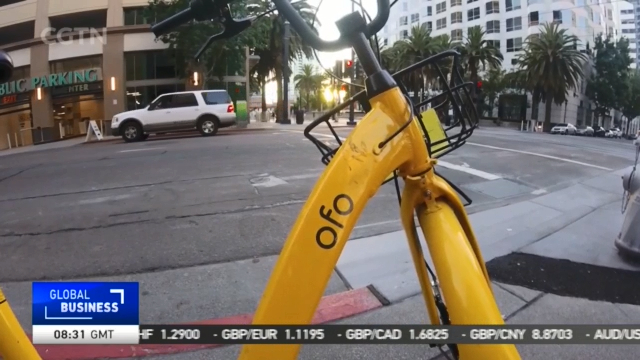
16:57, 07-Aug-2018
Bikeshare Backpedaling: Ofo reducing American operations
Updated
16:45, 10-Aug-2018
02:32

While the bikesharing craze shows signs of cooling in China, its largest player Ofo is now backpedaling on its international operations over riding etiquette and other issues. CGTN's Mark Niu reports from San Francisco.
Beijing-based Ofo helped pave the way for dockless bike-sharing internationally, making available 40-thousand bicycles in more than 30 U.S. cities.
LAWRENCE YUN BIKE-SHARE RIDER "More bike-sharing in the community, I think, it will be for the best."
But Ofo's US operations are now pedaling backward. The company is laying off staff, while pulling out of markets like Washington DC, San Diego, and likely many more to come. In a press release, Ofo explained why it pulled out of Chicago, saying: "The city's restrictive regulations have made it impossible for us to continue."
ASHA WEINSTEIN AGRAWAL, RESEARCHER MINETA TRANSPORTATION INSTITUTE "Most US cities are simply not designed to have lots of bikes moving around their communities. It's very different from Chinese or many European or Japanese cities where bicycles are just a critical part of the street scape. Many people see them almost as intruders and we just don't have shared norms about where they should park, what's polite riding behavior."
Each US city has its own regulations, leading Ofo to criticize Chicago for giving more permits to bikes that locked to something, as opposed to Ofo's, which lock on their own. In San Francisco, the city did not grant Ofo bike-sharing permits. But Ofo's still awaiting word on its application to be granted permits for the latest trend here, electric kick scooters.
MARK NIU SILICON VALLEY, CA "A 2018 survey from Populus Technologies found that in less than one year since the introduction of the electric kick scooter, 3.6% of adults in cities, where shared scooters are available, had used the devices. That's a faster adoption rate than both bike-sharing and even car-sharing."
Ofo's not alone in making the transition in US markets. The San Francisco company Spin is in the process of converting all of its shared bikes to shared scooters.
DERRICK KO, CO-FOUNDER & CEO SPIN "Our revenue on scooters is at least twenty times higher than bikes. That just shows an extremely strong product-market fit."
ASHA WEINSTEIN AGRAWAL, RESEARCHER MINETA TRANSPORTATION INSTITUTE "If you are going four blocks and not carrying much, a scooter is probably great. If you are going a couple of miles across town and you have a basket of groceries, then I doubt you are going to want to use a scooter."
While Weinstein Agrawal sees dockless bikes and scooters sharing US roads, she says it will take time for cities and riders to come up with the most sensible rules. Mark Niu, CGTN, San Francisco.

SITEMAP
Copyright © 2018 CGTN. Beijing ICP prepared NO.16065310-3
Copyright © 2018 CGTN. Beijing ICP prepared NO.16065310-3